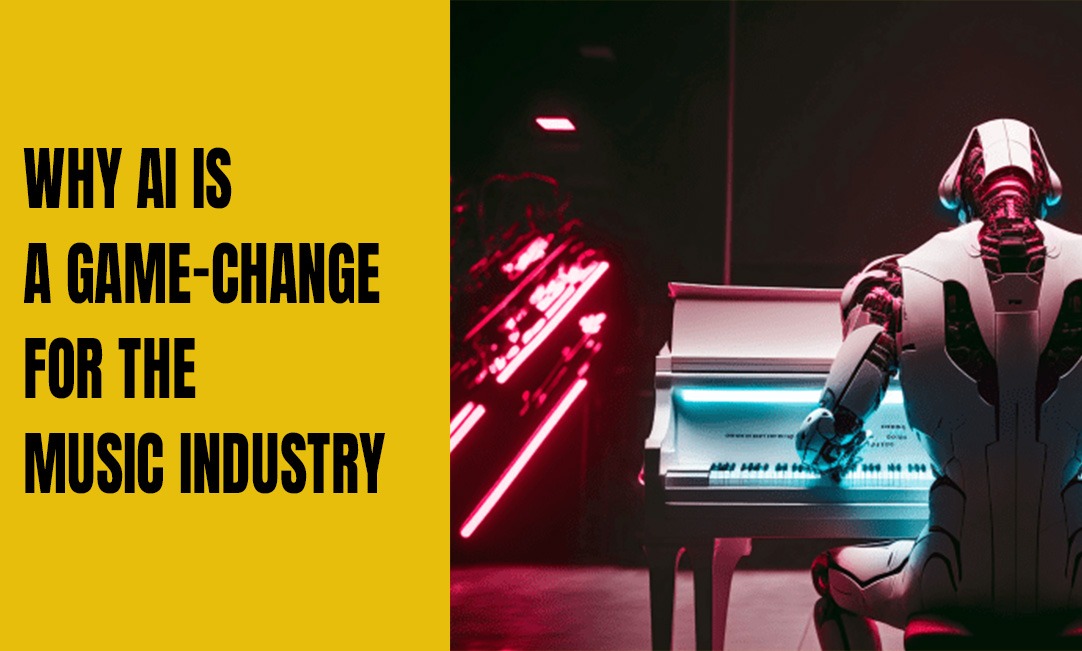Why AI Is a Game-Changer for the Music Industry

14 -Aug-2023
As you might know, the music industry has changed significantly with technological advancements shaping how we create, distribute, and consume music. Artificial Intelligence (AI) is one of the most profound technological innovations that has taken center stage. AI is transforming the music industry with new tools and opportunities for artists, producers, and consumers. In this blog, we'll look at how AI for music composition is changing the music industry and how it has the potential to reshape the landscape of music creation and consumption.
- AI-Assisted Music Creation
AI technology has created a new world of possibilities for music artists and composers. Artists can now generate music compositions, melodies, and beats using AI-driven tools and algorithms. These AI for music composition tools analyze massive amounts of musical data, allowing artists to experiment with styles and create music in previously unimaginable ways. Furthermore, AI-generated music can serve as a source of inspiration for music artists, providing them with new ideas and jumping-off points for their creative process.
Amper Music, AIVA and others are some of the most popular AI for music composition tool that allows users to generate custom music tracks for various purposes. These offer a range of genres, moods, and instrument combinations.
- Enhanced Music Production
Music production has always been time-consuming and requires skilled producers and sound engineers to mix and master tracks. However, AI for music composition tools has significantly streamlined this process. These can analyze and improve audio quality, correct flaws, and even isolate specific elements of a song for remixing, such as vocals or instruments. It speeds up the production process and allows artists to achieve professional-level results without requiring a large studio.
Amper Music, LANDR, and AIVA are AI-powered tools to master audio tracks. These analyze your audio and apply appropriate mastering adjustments to enhance the sound quality of your music.
- Personalized Music Recommendations
Music streaming services have become essential for how we listen to music. These platforms use AI algorithms to provide personalized music recommendations based on individual preferences, listening history, and user behavior. As a result, music fans can discover new artists and songs that match their preferences, resulting in a more enriching and tailored music experience.
Music streaming services, such as Spotify, Amazon Music, and others, use machine learning algorithms to analyze users' listening behavior, creating personalized playlists and stations. These consider genre preferences, mood, and past listening history to make recommendations.
- Copyright Protection and Royalty Management
Copyright protection is a pressing concern for artists and the music industry in the digital age. AI is critical in detecting and managing copyright infringements. Content recognition algorithms can search vast databases for unauthorized use of music and protect artists' intellectual property rights. Furthermore, AI-powered royalty management systems help ensure music artists get what they deserve for their work, which has long been a challenge in the industry.
AI tools, such as, Audible Magic, Tunesat, BMAT and Adrev, monitor music usage in various media, including television, radio, and online platforms. Most AI for music composition tools help artists and rights holders track when and where their music is being played and ensure proper royalty collection.
- Live Performance and Immersive Experiences
AI technology has also had an impact on live music performances. AI-generated visuals, interactive lighting systems, and immersive experiences help transform concerts and music festivals. AI for music composition can match the mood and tempo of the music in real-time, enhancing the overall ambience and creating unforgettable experiences for the audience.
For instance, Vuo is a visual programming language that enables artists and performers to create real-time interactive visual effects and animations. It creates visuals that react to real-time audio inputs or other sensor data. On the other hand, tools like Affectiva and Microsoft Azure's Emotion API can analyze audience emotions in real-time via facial expressions, allowing performers to adapt their acts based on audience reactions.
Conclusion
AI for music composition is reshaping music creation, distribution and experience. From AI-assisted music creation to personalized music recommendations and live performance enhancements, these allow artists and music fans to explore new frontiers. While AI is bringing a wave of innovation, it is critical to maintain a balance between human creativity and technological assistance. The future of the music industry lies in harnessing the power of artificial intelligence while preserving the unique essence of human expression in music. As AI advances, the possibilities for the music industry become limitless, and we can anticipate an era of unprecedented musical exploration and enjoyment.